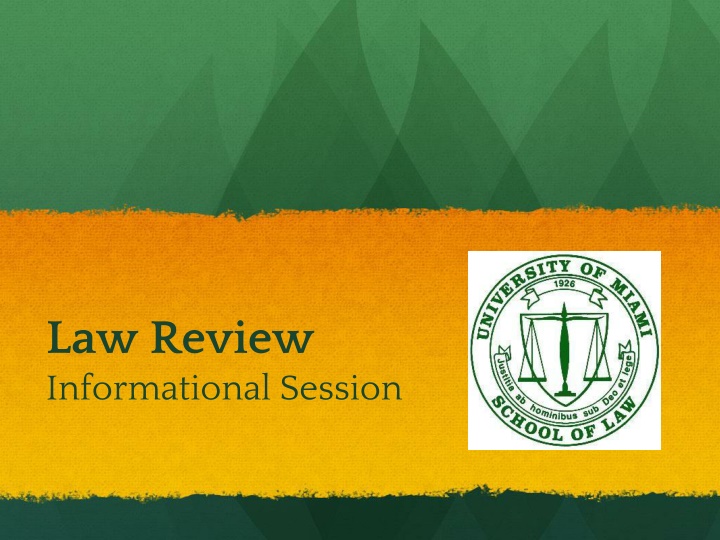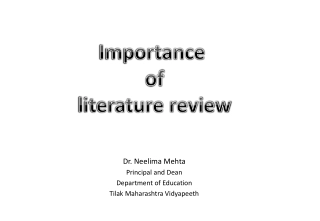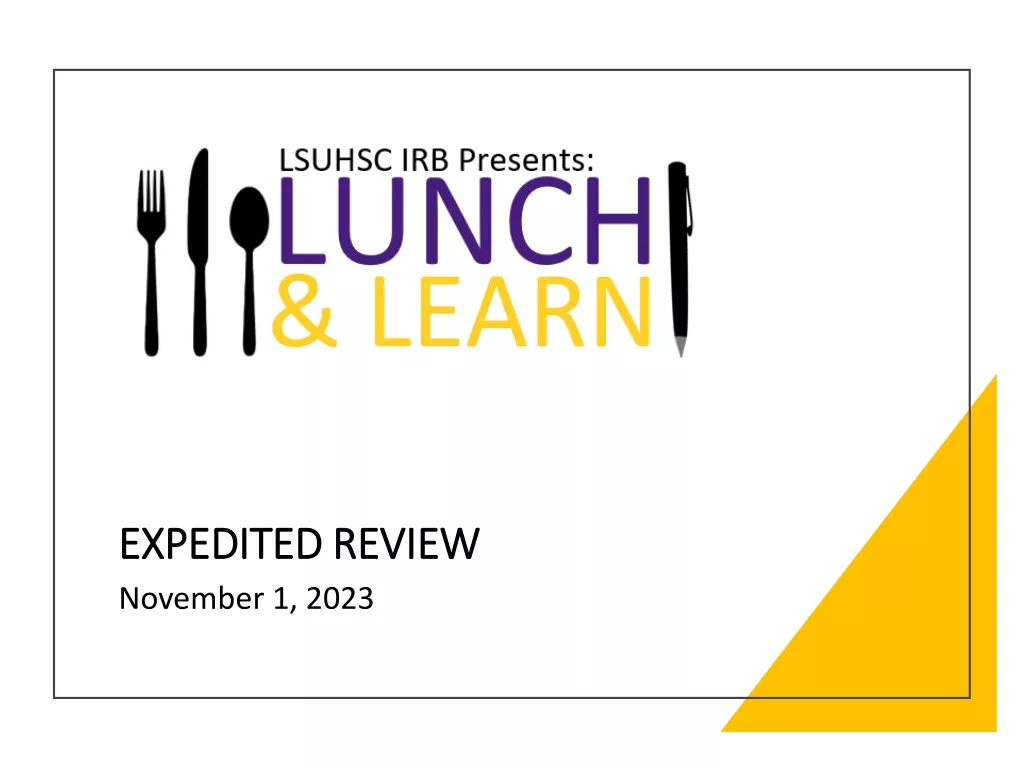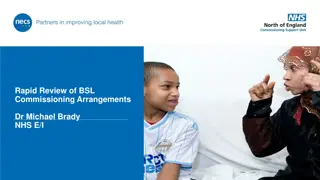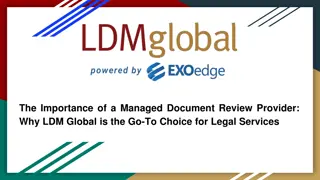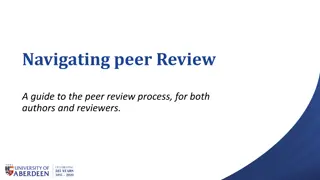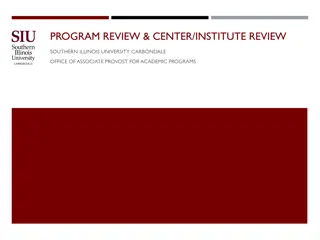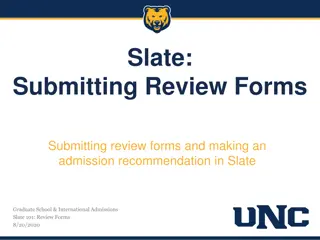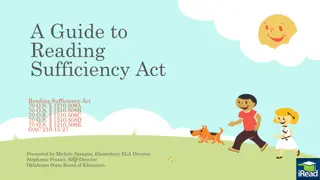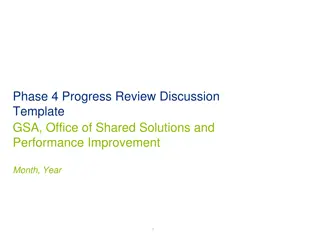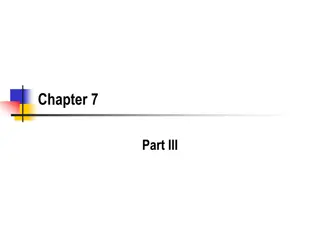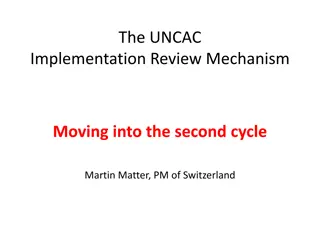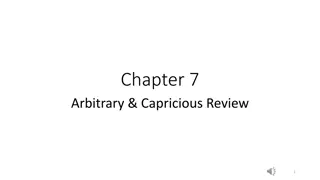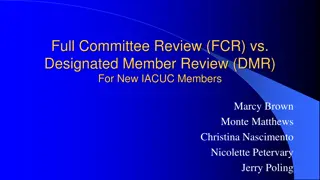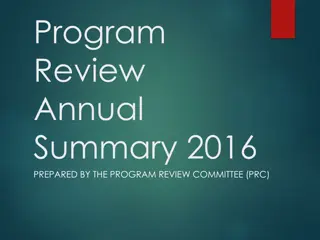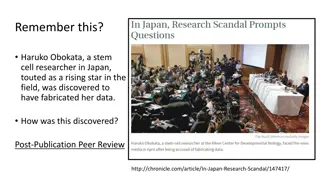Importance of Law Review for Law Students
Law reviews play a crucial role in developing editing, writing, and research skills for law students. They offer the opportunity to engage in scholarly work written by professionals, keeping them informed on current legal issues. Law reviews like University of Miami Business Law Review provide a platform for students to publish their work, network with alumni, and hone their skills through editorial processes. Participating in law reviews can also lead to job placements and enhance bluebooking skills essential in the legal field.
Download Presentation

Please find below an Image/Link to download the presentation.
The content on the website is provided AS IS for your information and personal use only. It may not be sold, licensed, or shared on other websites without obtaining consent from the author.If you encounter any issues during the download, it is possible that the publisher has removed the file from their server.
You are allowed to download the files provided on this website for personal or commercial use, subject to the condition that they are used lawfully. All files are the property of their respective owners.
The content on the website is provided AS IS for your information and personal use only. It may not be sold, licensed, or shared on other websites without obtaining consent from the author.
E N D
Presentation Transcript
Law Review Informational Session
Importance of Law Reviews What do law reviews do? Edit, Publish, and Write scholarly work Written by professors, judges, lawyers, students, and other professionals To keep the legal community informed and up to date with current and important legal issues. Benefits: Editing, Writing, & Researching Skills YAY EDITING, WRITING, & RESEARCH! Writing Credit for Your Student Note YAY WRITING CREDIT!** Bluebooking Skills YAY BLUEBOOKING! Judicial Clerkships Job placement Networking **This writing credit is optional and not based on your participation in a law review. If you would like to use the student note/comment you write for your law review requirements to also fulfill one upper level writing requirement, you may do so if you follow the proper procedures.
Law Reviews at Miami Law University of Miami Law Review Grade-on and write-on eligibility University of Miami Business Law Review Write-on eligibility only Inter-American Law Review Write-on eligibility only International & Comparative Law Review Write-on eligibility only Race & Social Justice Law Review Write-on eligibility only 2020 Law Review Writing Competition: All 1Ls and 2Ls are eligible to participate based on the eligibility requirements for each law review (more later)
University of Miami Business Law Review (UMBLR) Founded in 1990 Publishes long- and short-form work on recent, compelling, and cutting-edge business issues Publishes two full issues per year Opportunity to develop important writing and editing skills. Network with alumni of the business and legal communities.
UMBLR: Eligibility Requirements Must participate in the Writing Competition, and 1Ls: Have a 3.0 GPA or be in the top 50% of class; or 2Ls: Have a 3.2 GPA or be in the top 50% of class
UMBLR: Candidate Requirements Selected Candidate Requirements: Participate in UMBLR's editorial processes Submit a paper of publishable quality Write one blog post
UMBLR: Contact Information Editor-in-Chief: Brittany Pushkin, BLP26@miami.edu Senior Writing Editor: Harrison Strows, h.strows@law.miami.edu Website: http://business-law- review.law.miami.edu/
University of Miami Inter- American Law Review (IALR) Founded in 1969 (second-oldest) Forum for international and inter-American legal developments (business, human rights, tax, etc.) Publishes two issues per year Hosts Annual Lawyer of the Americas Banquet Over 800 alumni Judges (Federal & State) Alumni Advisor Partners at Am Law-100 Firms
IALR: Eligibility Requirements Must participate in the Writing Competition, and 1Ls: Have a 3.0 GPA or be in the top 50% of class; or 2Ls: Have a 3.2 GPA or be in the top 50% of class
IALR: Candidate Requirements Selected Candidate Requirements: Participate in editorial process Author a note of publishable quality Publish a blog post
IALR: Contact Information Office: D335 (third floor of Library) Website: http://law.miami.edu/IALR Editor-in-Chief: Alex Duffant amd377@law.miami.edu Senior Writing Editor: Vincent Halloran vxh142@law.miami.edu
International & Comparative Law Review (ICLR) Founded in 1991 Focus: A journal committed to issues that shape international relations. Articles published in our review are not isolated to a specific region, but address international and/or comparative issues. The most open topic of any of the secondary reviews. Publishes 2 issues per year
ICLR: Eligibility Requirements Must participate in the Writing Competition, and 1Ls: Have a 3.0 GPA or be in the top 50% of class; or 2Ls: Have a 3.2 GPA or be in the top 50% of class
ICLR: Candidate Requirements Selected Candidate Requirements: Participate in editorial process Submit a student note for publication consideration (30 page minimum) Two short blog posts, one per semester
ICLR: Contact Information Editor-in-Chief: Nick Beekhuizen , nab156@law.miami.edu Managing Editor: Savannah Young, sly21@law.miami.edu
Race & Social Justice Law Review (RSJLR) Founded in 2007 RSJLR is committed to the promotion and publication of scholarly articles that address the legal, social, economic, and psychological issues that affect communities of color and other groups affected by social injustices Publishes two issues per year Opportunities to network with RSJLR alumni
RSJLR: Eligibility Requirements Must participate in the Writing Competition, and 1Ls: Have a 2.9 GPA* or be in the top 60% of class; or *Will read casenotes written by 2Ls with a GPA between 2.90 and a 2.99 if these students submit a 750-word statement of interest at the same time as they register for the Writing Competition Please read the Law Review Information Memo for more details on the requirements for the statement of interest. 2Ls: Have a 3.0 GPA or be in the top 60% of
RSJLR: Candidate Requirements Selected Candidate Requirements: Participate in the editorial process Author 1-2 blog posts per academic year Approximately 2 pages on a timely topic Submit a note for publication consideration Must be written under the supervision of a faculty member for academic credit
RSJLR: Contact Information Editor-in-Chief: Sydney Smith, sns137@law.miami.edu Staff Managing Editor: Christina Ferreiro, rsjlr@students.law.miami.edu RSJLR Website: https://race-and-social-justice- review.law.miami.edu
University of Miami Law Review (UMLR) The University of Miami s flagship law review Oldest: Founded in 1947 Most cited: Publications cited by all circuits and Supreme Court Scholarly publication that publishes four times a year Open-topic law review Issue 2: Symposium Issue Issue 4: Eleventh Circuit Issue Networking with notable alumni: Alumni Advisory Board and Young Alumni Council
UMLR: Eligibility Requirements Grade-on Eligibility: Top 6% of class or section (1Ls) COVID-19 Emergency Policy Allow for more write-on invitations Write-on Eligibility: Top 33 1/3% of class (1Ls & 2Ls) Must not receive a Unsatisfactory in all 2020 Spring semester courses Must attend How to Write a Casenote Workshop TBD, Summer 2020 Expectations, tricks and tips! Panel with successful write-on members! Must have attended the 2020 UMLR Symposium * If you were unable to attend the 2020 UMLR Symposium and have been in contact with Farah Barquero, you will be permitted to compete.
UMLR: Candidate Requirements Selected Candidate Requirements: Participate in editorial process Minimum of 3 editing cycles Complete a student note or comment of publishable quality Minimum of 35 pages Write a 500-word blog post on a timely issue
UMLR: Contact Information Editor-in-Chief: Jose Espinosa, jespinosa@law.miami.edu Senior Writing Editor: Henry Moreno, ham99@law.miami.edu Website: http://lawreview.law.miami.edu/ Office: B346 (third floor of Library)
2020 Law Review Writing Competition: Introduction Required to write a casenote Identify and analyze a new development in law We will provide topic and sources for you Graded based on Analysis Creativity Writing Grammar Bluebooking RANK the journals according to your preference You will only receive ONE offer
2020 Law Review Writing Competition Registration Registration Opens: Monday, 6/22/2020 at 12:00 Noon Closes: Monday, 6/29/2020 at 5:00 p.m. Late registrations will NOT be accepted Registration confirmation & Anonymous Grading Number (AGN) emailed by 7/1/2020 at 6:00 p.m. No cost to participate unless you elect to have the materials packet printed for you Printed packet contingent on Law Library operation in June Packet Cost: $35 Pay via credit card when you register or pay cash when you pick up the packet on the first day of the competition.
2020 Law Review Writing Competition Schedule Starts: Thursday, 7/2/2020 at 10:00 a.m. If Law Library is operational, can pick up printed packet until 5:00 p.m. Ends: Sunday, 7/12/2020 at 5:00 p.m. No identifying information; only AGN Will receive submission confirmation by 8:00 p.m. No late submissions will be accepted! Announcements of Winners: Tuesday, 7/28/2020
Writing Competition: Materials & Topic We will provide you ALL the source you need! Between 450-550 pages Will include recent case & supporting/related material Equal opportunity to argue both sides CANNOT USE OUTSIDE MATERIALS (other than your Bluebook) The topic of the Writing Competition must be kept confidential prior to the start of the Competition.
Casenote Quick Overview Formatting: Text: No more than 12 double-spaced pages Endnotes: no more than 8 pages Citations in Bluebook format (use the white pages!) Title, but no cover page Page numbers Font: Times New Roman, size 12 No identifying information other than AGN Certificate of Compliance Scheduling: Inform employers as early as possible if you think you are going to participate in the Writing Competition.
Honor Code: Collaboration NO OUTSIDE ASSISTANCE!: Any outside assistance AT ALL is prohibited. This includes, but is not limited to, assistance from all of the following Any member of any law review; Other students competing in the competition; Other students not competing in the competition; Professors; Bosses; Judges; Paralegals; Moms; Dads; Siblings; Pets; Literally anyone, etc. This also means that you cannot read/edit anyone else s casenote or have anyone else read/edit your casenote
Honor Code: Plagiarism NO PLAGIARISM!: Violation of the competition AND the Law School s Honor Code.. Defined as knowingly appropriating another s words or ideas and representing them as one s own. University of Miami School of Law Honor Code 1.03(b) Tips: When in doubt, cite it out!!!!!!!! Identify all sources relied upon If a direct quote, use quotation marks If paraphrased or if ideas are substantially derived from a source, identify the source Use SIGNALS when not direct support (like a direct quote).
Casenotes: More Information How to Write a Casenote Presentation Will discuss casenotes in greater detail Available at https://lawreview.law.miami.edu/writing- competition/ Mandatory Attendance
Questions? Farah Barquero, fbarquero@law.miami.edu; B349 University of Miami Law Review, Director, Programs
